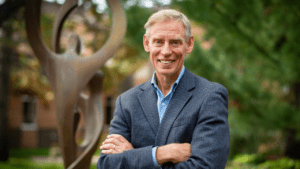From Bird Island, MN to Kenya: David Neubauer, DC ‘83
“I knew I wasn’t getting the farm!”
In recalling his upbringing in Bird Island, Minnesota—a small farming community of roughly 1,300 people, David Neubauer said he wanted to be a professional and that he wanted to serve—he just wasn’t sure whom he wanted to serve.

Neubauer attended NWHSU in the early 1980s, and his graduating class was the last at the school’s former location in St. Paul. “I had a great experience and learned so much,” he recalled. “Still to this day, I have teachers who are now friends and colleagues.”
He refers to himself as a student of learning. And following a year spent at a practice in Olivia, Minnesota, after completing his studies in St. Paul, Neubauer headed west to California to study acupuncture. However, he explains that even after receiving a degree, he rarely practiced it because he was so busy with his chiropractic work.
Neubauer now works out of his practice in Waconia, but for two decades following his return from the west coast, he worked out of a practice in his hometown of Bird Island.
Around seven years ago, Neubauer was approached by someone from the Rocky Vista University of Osteopathic Medicine about becoming a part of a group that would regularly travel to Kenya for two weeks at a time and treat the population living in the villages—primarily comprised of medical students, the group was interested in adding a chiropractor.
“This was a place where, seven years ago, they have no idea what care for the spine meant,” Neubauer said about his work with the villagers in this part of Kenya, adding that traditionally, the women of the villages travel two or three miles to bring back large amounts of water, or often carry heavy loads of supplies using ropes wrapped around their shoulders. “You can imagine the pressure that puts on the structure of the spine,” he explained. After a chiropractic adjustment, the responses he regularly hears from patients are “I feel free,” or “I feel lighter.”
He also remembers his experience with Jackson—the head of the village, or the “chairman,” who was initially extremely hesitant about getting onto Neubauer’s table for an adjustment. Once Jackson had been convinced to participate and an adjustment occurred, Neubauer remembers thanking him for his placement of trust.
“Jackson took me into a corner and said to me, ‘I didn’t tell you what was wrong with me,’” Neubauer said. “‘But you told me what was wrong with me.’”
After seven trips over eight years, and the reputation he has built in introducing chiropractic care to the villagers, his hope for the immediate future is that there would be a way to teach the discipline itself to the locals. “I would love to find a way to get one or two people from Kenya to NWHSU on a scholarship. Many of them barely make $100 a month,” he said. “But they are gifted with their hands, their sense of work, and commitment to be better.”
“People told me eight years ago that this it’ll change you,” Neubauer said while reflecting on his work in Kenya. “I heard that from enough people, and I said I am not going there to change. I’m going to offer services. But they were 100% right. I came back with ten times more of what I received than what I gave, and I gave with my heart. I still do.”